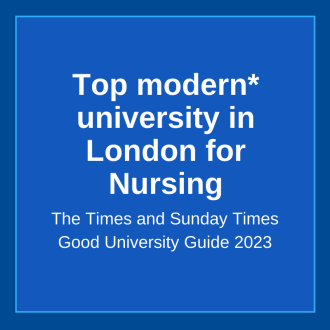- Postgraduate
Nursing (Top-up) MSc
Overview
This course is designed for registered nurses who have completed their pre-registration PgDip Nursing (Adult/Mental Health/Learning Disabilities) at the University of West London and would like to ‘top-up’ their award to a full Masters degree.
The MSc Nursing course will encourage you to refine your knowledge and skills in healthcare and nursing, including:
- independence and self-direction
- systematic and critical approaches to evaluating evidence
- an understanding of research methodological approaches
- ability to communicate with specialist and non-specialist audiences.
This Nursing Masters Top Up course is run from our West London campus, but it is also offered at the Berkshire Institute for Health in Reading.

Select your desired study option, then pick a start date to see relevant course information:
Start date:
If your desired start date is not available, try selecting a different study option.
Why study Nursing (Top-up) with us?


What our students say…
UWL has truly state-of-the-art facilities. I feel like I'm learning something new every day.




Course detail & modules
Throughout the course, you will learn from committed and highly skilled staff, many of whom are conducting research in their specialist areas, ensuring that your studies are both challenging and rewarding.
We will provide a supportive learning environment to help you gain confidence as you develop your skills.
There are two modules in this award – Systematic Reviews: Principles and Methods and Rapid Systematic Review of Evidence to Inform Professional Practice Project.
The first introduces you to the skills you will use in the second. The modules' combined aim is to enable your use of evidence to support your practice.
Compulsory modules
-
Systematic Reviews: Principles and Methods
The National Institute for Health Research (2019) describes a systematic review as: ‘Evidence-based healthcare relies on the availability of the best evidence upon which patient-centred clinical decisions can be made. Reviews make a significant contribution to this by attempting to identify the totality of evidence available, appraising and then summarising this evidence.’
This module will explore the principles and methods of undertaking a systematic review.
-
Project - Rapid Systematic Review of Evidence to Inform Professional Practice - Level 7
This project module aims to provide you, the practitioner, with the opportunity to synthesise the evidence base for an area of professional/clinical healthcare practice or service delivery.
You will demonstrate the ability to bring together and quality assess evidence from primary research and where appropriate stakeholder engagement using transparent methods and critical scholarship to inform healthcare/practice.
Entry requirements
You should:
- have a PgDip Nursing (pre-registration) from the University of West London
- be registered with the Nursing and Midwifery Council (NMC)
- currently work in clinical practice in the UK.
You may be invited to an interview as part of your application.
Fees & funding
You will be charged a fee based on the credits you study.
You may be funded by your employer to study this course or you can self-fund.
For more information on fees and funding please contact Catherine Lynch
Funding your studies
You may be eligible for a student loan to cover the cost of tuition fees, or a maintenance loan.
We help keep your costs down by offering free transport between our London campuses. Our Student Services teams can also offer advice on managing student finances, working while you study, and more. View full details, including conditions and eligibility.
You will be charged a fee based on the credits you study.
You may be funded by your employer to study this course or you can self-fund.
For more information on fees and funding please contact Catherine Lynch
Funding your studies
You must be classified as a UK student before starting this course.
Visit the UK Council for International Student Affairs (UKCISA) website for information about whether you qualify as a UK student or as an International student.
Teaching staff

Dr Catherine Lynch
I have been leading various iterations of the Masters in Advanced Practice since 2009 at UWL, taking revised versions of the program through successful validation/revalidation ever 4 years. In addition, I led on the accreditation of the MSc Advanced Clinical Practice programme with Health Education England in 2020. I am passionate about empowering healthcare practitioners with the soft skills to make a different in their practice and cite the discovery of emotional intelligence and transactional analysis amongst my highlights in academia. During the pandemic, I became a proficient user of graphic design software, predominantly using Canva and Adobe Creative Cloud, which I believe gives my students an immersive and entertaining, quality learning experience.
I have been leading various iterations of the Masters in Advanced Practice since 2009 at UWL, taking revised versions of the program through successful validation/revalidation ever 4 years. In addition, I led on the accreditation of the MSc Advanced Clinical Practice programme with Health Education England in 2020. I am passionate about empowering healthcare practitioners with the soft skills to make a different in their practice and cite the discovery of emotional intelligence and transactional analysis amongst my highlights in academia. During the pandemic, I became a proficient user of graphic design software, predominantly using Canva and Adobe Creative Cloud, which I believe gives my students an immersive and entertaining, quality learning experience.
Study & career progression

This nursing top-up course aims to enhance your clinical practice and allow career progression.
Alternatively, you could continue your studies at UWL. On successful completion of this course we encourage you to consider a Professional Doctorate or PhD.
We also offer Continuing Professional Development (CPD) courses for healthcare practitioners.
How to apply

You can apply online at any time by following the link below.
Our application form will ask you for some information about what you want to study, your previous qualifications or experience, and how we can contact you.
Want to ask us a question first? We would love to hear from you. Contact us free on:
- 0800 036 8888
- courses@uwl.ac.uk
Apply for this course
Next steps after making your application
We aim to make a decision on your application as quickly as we can. If we need any more information about your qualifications, we will be in touch.
In the meantime, come and visit us and find out more about what studying at UWL is like. Sign up for an open day or join a campus tour.
Visit us and see for yourself
Talk to our tutors and find out about our courses and facilities at our next open day or join a campus tour.
We're here to help
Any questions about a course or studying at UWL? We're here to help - call us on 0800 036 8888 (option 2, Monday – Friday 10am-4pm) or email us on courses@uwl.ac.uk.
Our postgraduate prospectus
All of our courses in one place - download now or order a hard copy.
Related courses
Search for courses
Student life at UWL
Important notes for applicants
Disclaimer
*Modern universities - defined as higher education institutions that were granted university status in, and subsequent to, 1992.
**The National Student Survey 2023 and 2024 - Average of answers to all questions by registered student population. Excludes specialist institutions.
Testimonials - our students or former students provided all of our testimonials - often a student from the course but sometimes another student. For example, the testimonial often comes from another UWL student when the course is new.
Optional modules - where optional modules are offered they will run subject to staff availability and viable student numbers opting to take the module.
Videos - all videos on our course pages were accurate at the time of filming. In some cases a new Course Leader has joined the University since the video was filmed.
Availability of placements - if you choose a course with placement/internship route we would like to advise you that if a placement/internship opportunity does not arise when you are expected to undertake the placement then the University will automatically transfer you to the non-internship route, this is to ensure you are still successful in being awarded a degree.














